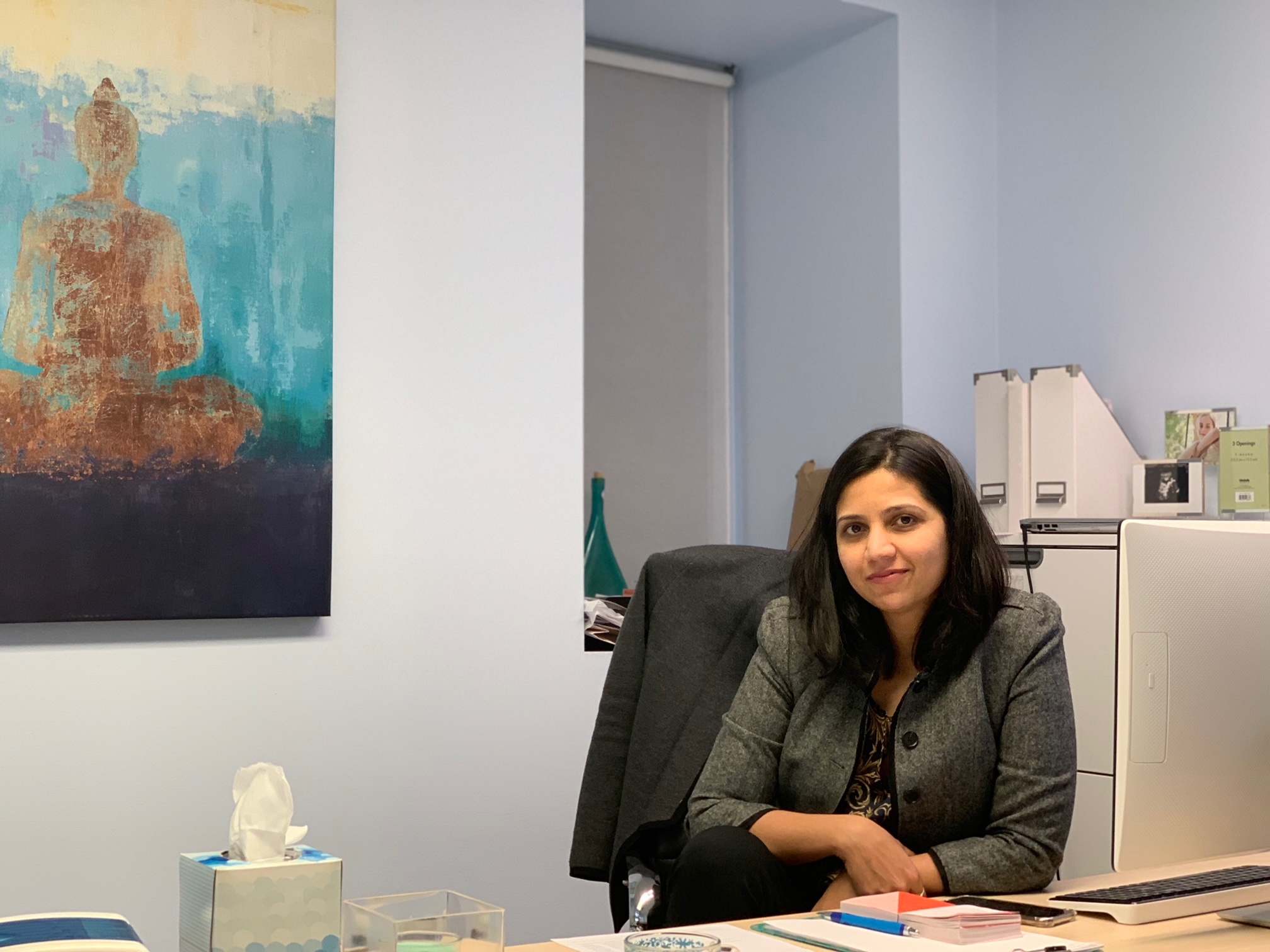
Chitra always knew that she wanted to work in physical therapy. Growing up, she had seen her father struggle with ankylosing spondylitis, which caused chronic pain and discomfort in his spine that he had to receive treatment for regularly. For Chitra, becoming a physical therapist meant being able to help people spend more quality time with their loved ones.
After graduating from college in India, Chitra began to work as a physical therapist before coming to the U.S. in 2003, when she was 22 years old. One part of her had wanted to receive a professional education in physical therapy—for which she enrolled as a masters student at the University of Indianapolis—and another had been aching to escape the inevitability of an arranged marriage in India.
“I actually came here on August 15, which is the Independence Day for India as a country,” she recounts during an interview with Cho Law. “I felt like that was my own independence, in a way.”
Though she wasn’t one quite yet, the budding entrepreneur within Chitra had always wanted to do things her way, an attitude that would ultimately define the shape of her career. After completing her graduate program in 2005, Chitra began working as a traveling physical therapist, finding jobs in outpatient clinics in Indiana, Massachusetts, New York, and New Jersey.

“I wanted to see what was out there,” she said. I was still new to the country, and I wanted to see and explore how the industry worked.”
But despite feeling pride at finally being able to help people through the practice of physical therapy, Chitra felt it still wasn’t quite enough. Working as an employee at an outpatient clinics, Chitra felt that having to hover between several patients at a time wasn’t conducive to achieving the best results for her patients, nor was it allowing her to use her broad range of physical therapy knowledge. Chitra believed that her patients’ therapy should be personalized and tailored to their needs, rather than trying to impose a one-size-fits-all solution on every client. For her, limiting the therapy to a simple list of exercises was unfair and ineffective.
Leaving a stable job to pursue her own business was a big risk, especially considering that she had no family or support within the United States. But then again, a driving sense of independence was what had gotten Chitra to the U.S. in the first place.
“If they can do it, I can do it too,” she had told herself when she left to start her own practice. Her business, named Liberty Physical Therapy, was built around the essential notion that each patient would have 45 minutes devoted solely to them, during which Chitra would identify exactly what their issue was to offer a tailored array of exercises.
“That was freedom for me,” she says, thinking back to her decision to start Liberty. “To be able to practice the way that I wanted.”
Chitra’s intensive approach to physical therapy quickly began to return fulfilling results and satisfied customers. However, with the increased time spent on each case, the number of clients that she could take dramatically decreased. Furthermore, she soon came to find that without a business or management background, it was difficult for her to do her best work as a therapist while optimizing her practice for expansion. In her interview with Cho Law, she spoke at length about her drive for self-improvement, to expand as many dimensions of herself as she could in order to become the leader she needed to be to run her business. Whether it was by reading (see Chitra’s book recommendations at the bottom of the page), seeking business mentors, or enrolling in year-long management courses to figure out for herself how to operate and improve her practice, Chitra constantly sought to learn as much as she could.
Chitra believes that Liberty PT’s expansion, however, was not entirely due to business expertise. In fact, Chitra explains that the key to their success lied in their persistence in being true to their values—in treating each client as an individual with specific problems.
“We promised that we were gonna give you good care and that we would provide it with good intentions,” Chitra said.
Client by client, word of Liberty Physical Therapy spread throughout Jersey City, as more people began to relate positive experiences of being cared for by Chitra. Today, after more than a decade of being in business, Liberty Physical Therapy employs upwards of 25 medical professionals and physical therapists and has hundreds of testimonials by current and former clients. When asked what she was most proud of with regards to being a successful entrepreneur as a first generation immigrant, Chitra cited her resilience, as well as that of those who helped build the business.
“There were so many sleepless nights and stressful days and periods when [we felt] very challenged at times,” she recounted. “There [was] a lot of growth that [needed] to happen personally and professionally, and through all that, we persisted and we pushed through and we kept growing.”
“The one thing I would tell people is that if they can do it, you can do it too. You just might have to put a little extra effort to get there, but if you are determined and persistent—obviously you’re gonna need a lot of help, so get the right assistance, don’t run in the wrong direction—but you have to believe that you can do it. There will be challenges, and everybody faces challenges; yours might be a little different than others, but it doesn’t matter. You’re just as capable, you just gotta keep at it, and nothing’s impossible.”
Chitra’s reading list for self-improvement: The E-Myth Revisited: Why Small Businesses Fail and What to Do About It, by Michael E. Gerber; The Road Less Stupid: Advice from the Chairman of the Board, by Keith J. Cunningham; Creating Magic: 10 Common Sense Leadership Strategies from a Life at Disney, by Lee Cockerell; 7 Strategies For Wealth and Happiness, by Jim Rohn.
